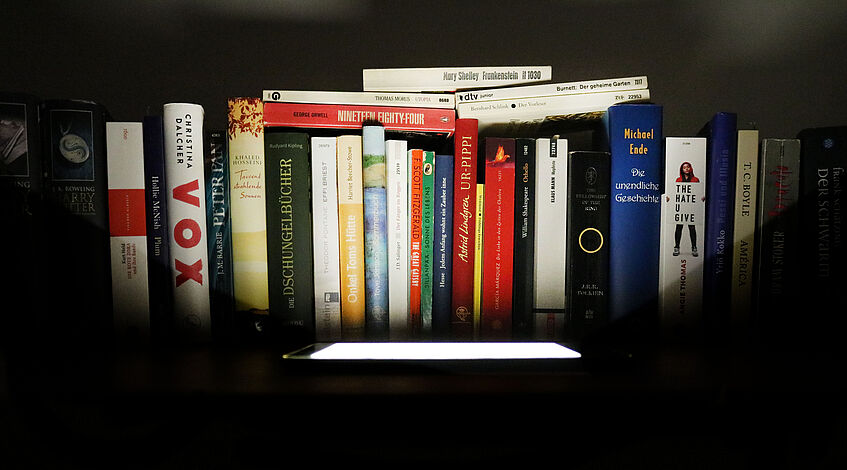Books on Screen - The consequences of digital fiction reading

Photo: A. Schwabe
Books on Screen - The consequences of digital fiction reading
The digitization of reading is increasing with the spread of digital reading devices (tablets, smartphones or e-readers) and the availability of digital texts, so that reading books on screen could become a permanent phenomenon. Even though the growth rates of e-book sales have slowed down, according to the Börsenverein des Deutschen Buchhandels (German Publishers and Booksellers Association), more than 32 million digital books, excluding specialist and school books, were sold in Germany in 2018. Readers with e-readers or I-pads are increasingly being noticed in everyday social life as well as in university courses. Also, schools are discussing whether the use of e-books should replace the printed book. In public debates, reading on screen is repeatedly discussed as a threat to reading culture, but so far, too little attention has been paid to the concrete consequences of the digitization of literary texts for the reading process. According to central theses of cultural studies as well as communication studies, different reading media go hand in hand with different reading behavior and different reading experiences. Régis Debray formulates pointedly: “Historians of the written know (...) that the history of signs starts with the history of the material. (…) There is no innocent substrate, every substrate takes its toll. (translation by author)“[1]
This research project aims to explore the question of how literary experience changes when texts are no longer read in printed book form but on a screen. In concrete terms, this involves texts of narrative literature of varying degrees of complexity. It thus contributes with a specific perspective to international reading research, which is currently growing rapidly (see, for example, the E-READ initiative). We assume that a phenomenon as multifaceted as literary reading can only be sufficiently investigated with a transdisciplinary research approach. For this reason, this project combines competencies from literary science, communication science, and psychology. In a series of empirical experiments, the aim is to examine, on the basis of literature, reading, and communication theory, how different reading media - printed book, e-reader, and tablet - affect central dimensions of the literary experience, such as (1) narrative coherence, (2) imagination, (3) immersion, (4) empathy, and (5) analytical reading. Further, it is necessary to determine whether differences in literary experience between digital and printed form are influenced by the specific complexity of the literary text (in terms of chronology, mode, diegetic levels). The results will be interpreted and deepened with the help of focus groups. This should provide important insights for the participating sciences, but above all also for the social institutions that support reading culture – like schools, universities, the book trade, publishing houses, and libraries.
[1] Debray, Régis: Einführung in die Mediologie. Bern, Stuttgart, Wien: Haupt 2003, S. 54f.
